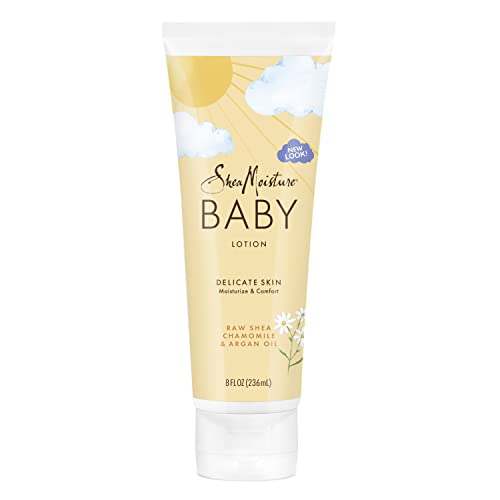

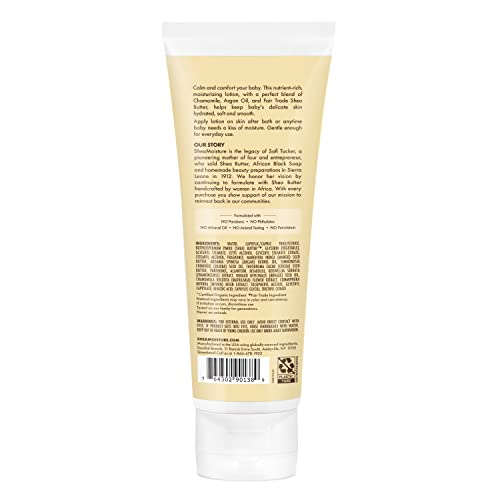
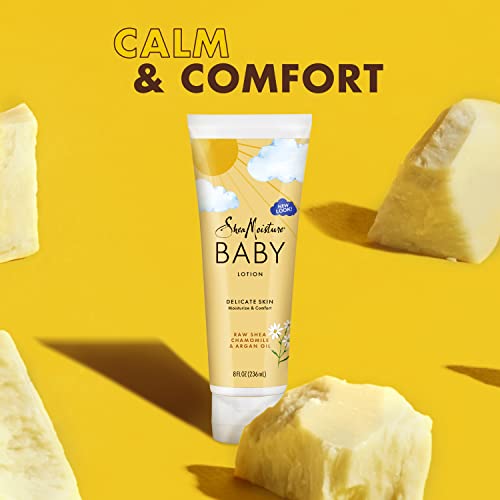
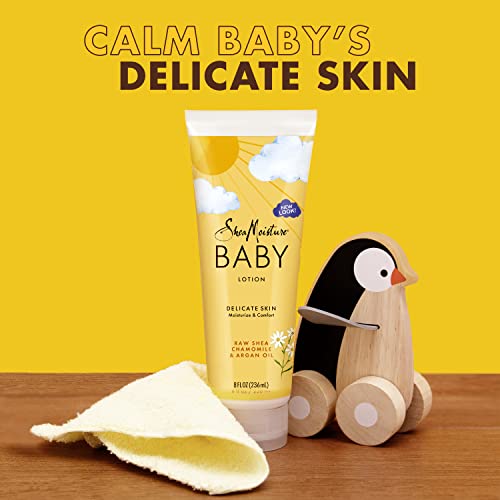
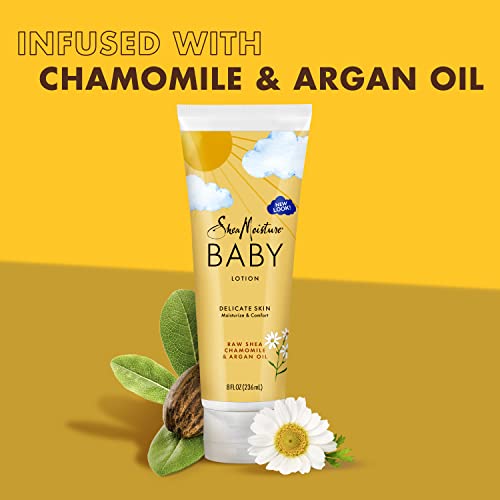
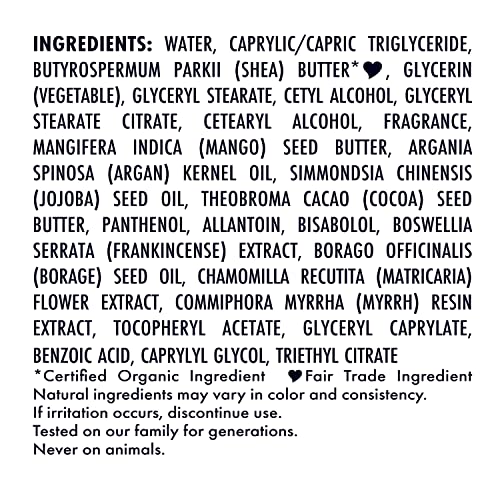
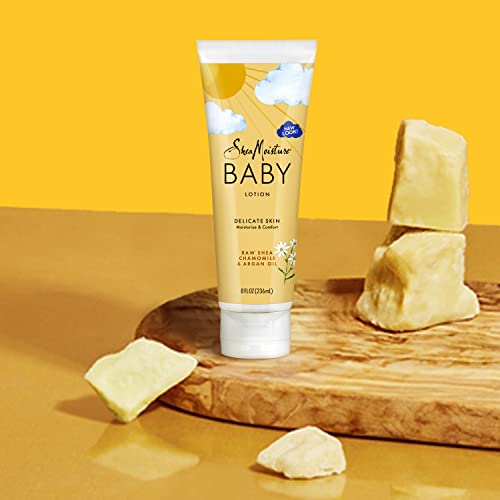
SheaMoisture Baby Lotion - Soothes Dry Skin with Chamomile & Argan Oil - 8oz


Emulsifying Wax
Medium RiskEmulsifying wax is a mixture derived from plant and synthetic sources, primarily used to stabilize emulsions in cosmetic and personal care products. Its primary function is to blend oil and water-based ingredients, ensuring a uniform consistency and enhancing product texture.
Sustai Insights
Emulsifying wax offers functional benefits as an effective emulsifier, helping to create stable formulations in cosmetic products. It generally poses low health risks, with minimal concerns regarding carcinogenicity and allergenic potential. Environmental risks are also low, with no significant pollutant or bioaccumulation issues. However, use restrictions exist, and irritation potential is noted for sensitive skin. Regulatory assessments indicate it is safe for use within established concentration limits, leading to an overall moderate risk assessment. Alternatives like plant-based emulsifiers may offer sustainable options.
Borago Officinalis (Borage) Oil
Low RiskBorago officinalis (borage) oil is derived from the seeds of the borage plant, known for its high gamma-linolenic acid (GLA) content. It is commonly used in cosmetic and skincare products for its moisturizing properties, as well as in dietary supplements for its potential health benefits.
Sustai Insights
Borage oil provides functional benefits as a skin moisturizer and may support skin health due to its GLA content. It is biodegradable and can be sustainably sourced. Health risks are minimal, with low concerns for carcinogenicity, allergies, and reproductive toxicity. Environmental risks are also low, as it does not contribute significantly to pollution or bioaccumulation. No regulatory restrictions are noted. Overall, the ingredient is assessed to have a low risk level, making it a viable option in formulations.
Commiphora Myrrha (Myrrh) Extract
Low RiskCommiphora myrrha extract is an extract derived from the resin of the myrrh tree, primarily used in cosmetic and therapeutic products for its potential anti-inflammatory and antimicrobial properties. It is often incorporated into formulations for skin care and wellness applications.
Sustai Insights
Commiphora myrrha extract offers functional benefits such as antimicrobial properties and potential skin-soothing effects. It is generally regarded as low risk, with little evidence of adverse health effects, including low concerns for carcinogenicity, allergies, and reproductive toxicity. Environmentally, it does not appear to be bioaccumulative or a significant pollutant. Regulatory bodies, including the FDA, do not impose restrictions on its use. However, like all extracts, it should be used with caution, particularly in sensitive individuals. Alternatives for similar effects may include other plant extracts with antimicrobial properties. Overall, the ingredient is assessed to have a low risk profile.
Mangifera Indica (Mango) Seed Butter
Low RiskMangifera indica (mango) seed butter is a fat extracted from the seeds of the mango fruit. It is commonly used in cosmetic formulations for its emollient and moisturizing properties, providing a smooth texture and enhancing product stability.
Sustai Insights
Mango seed butter offers functional benefits such as effective moisturization and skin conditioning, derived from its fatty acid profile. It is considered low risk regarding health concerns, with minimal allergenic potential and no significant environmental hazards. Regulatory agencies have not imposed restrictions on its use. Overall, the ingredient is assessed as low risk, making it a suitable option for various cosmetic products. Alternatives include other plant-based butters like shea or cocoa butter for similar properties.
Boswellia Carteri (Frankincense) Oil
Low RiskBoswellia carterii oil, commonly known as frankincense oil, is a volatile oil extracted from the resin of the Boswellia tree. It is primarily used in aromatherapy, cosmetics, and traditional medicine due to its aromatic properties and potential anti-inflammatory effects.
Sustai Insights
Boswellia carterii oil offers functional benefits such as anti-inflammatory properties and is often sustainably sourced, contributing to its appeal. Health risks are low, with minimal concerns regarding carcinogenicity, allergies, or reproductive toxicity. Environmentally, it poses low risks and is not classified as a pollutant or bioaccumulative. Regulatory bodies do not impose significant restrictions on its use. Overall, it is assessed to have a low risk profile. Safe usage practices should be followed, and alternatives may include other essential oils with similar properties.
Butyrospermum Parkii (Shea Butter) Oil
Low RiskButyrospermum parkii (shea butter) oil is a lipid extracted from the nuts of the shea tree, primarily used in cosmetics and personal care products for its emollient properties, providing moisture and enhancing skin texture.
Sustai Insights
Shea butter oil offers functional benefits as an effective moisturizer and skin conditioner, while being sustainably sourced from shea trees. Health risks are minimal, with low concerns for carcinogenicity, allergies, or reproductive toxicity. Environmental impacts are limited, with no significant pollutant or bioaccumulation risks identified. Regulatory status is favorable with no major restrictions; hence, it is classified as low risk overall. Safe usage is advised, and alternatives like cocoa butter may be considered.
Argania Spinosa (Argan) Kernel Oil
Low RiskArgania spinosa (argan) kernel oil is a fixed oil extracted from the kernels of the argan tree, native to Morocco. It is commonly used in cosmetic formulations for its moisturizing properties, serving as an emollient and skin conditioner.
Sustai Insights
Argania spinosa kernel oil offers functional benefits such as effective hydration and nourishment for the skin and hair. It is sustainably sourced and biodegradable, contributing positively to environmental considerations. Health risks are low, with minimal concerns regarding carcinogenicity, allergies, or reproductive toxicity. There are no current regulatory restrictions on its use. Overall, it poses low risk, making it a suitable ingredient in cosmetic products. Safe usage practices should be maintained, and alternatives like jojoba oil may also be considered for similar benefits.
Oenothera Biennis (Evening Primrose) Oil
Low RiskEvening primrose oil is extracted from Oenothera biennis seeds and is commonly used in cosmetic formulations for its moisturizing properties. It contains gamma-linolenic acid (GLA), which is believed to support skin health and improve hydration.
Sustai Insights
Evening primrose oil offers functional benefits as a moisturizer and skin soother, derived from sustainably sourced seeds, contributing to its appeal. Health risks are low, with negligible concerns regarding carcinogenicity, allergies, and reproductive toxicity. Environmental assessments indicate no significant pollutants or bioaccumulation potential. Regulatory bodies do not impose restrictions on its use. Overall, the risk level is low, making it a suitable choice for cosmetic applications. Safe usage practices should be followed, although alternatives like borage oil may provide similar benefits.
Vegetable Fatty Acid
Low RiskVegetable fatty acid is a natural compound derived from plant sources, primarily used as an emollient and emulsifier in cosmetic and personal care products. It contributes to the texture and stability of formulations, enhancing product performance.
Sustai Insights
Vegetable fatty acid offers functional benefits such as effective emulsification and skin conditioning. It is generally recognized as having low health risks, with minimal concerns related to carcinogenicity, allergies, or reproductive toxicity. Environmentally, it poses low risks as it is biodegradable and does not bioaccumulate. Regulatory bodies have not flagged it for significant restrictions. Safe usage practices include adhering to recommended concentrations in formulations. Overall, it is assessed as low risk, with no major adverse effects reported, making it a suitable choice in formulations.
Lonicera Japonica (Honeysuckle) Flower Extract
Low RiskLonicera japonica (honeysuckle) flower extract is derived from the flowers of the honeysuckle plant. It is commonly used in cosmetic formulations for its potential soothing and anti-inflammatory properties. The extract may also provide some antioxidant benefits, contributing to the overall stability and performance of the product.
Sustai Insights
Honeysuckle flower extract offers functional benefits, including soothing and anti-inflammatory effects, which can enhance skin feel in formulations. It is considered low risk for health concerns, such as carcinogenicity, allergies, and reproductive toxicity, with no significant environmental hazards reported. Regulatory bodies do not impose restrictions on its use, supporting its safety profile. Safe usage practices should be followed, although alternatives such as chamomile extract may offer similar benefits with potentially different profiles. Overall, the ingredient presents a low risk assessment.
Theobroma Cacao (Cocoa) Seed Butter
Low RiskTheobroma cacao (cocoa) seed butter is extracted from the roasted seeds of the cocoa plant. It is commonly used in cosmetics and skincare products for its emollient properties, helping to moisturize and soften the skin. Cocoa butter is also known for its stability and resistance to rancidity.
Sustai Insights
Cocoa butter is recognized for its effective moisturizing properties and is sustainably sourced, contributing to its appeal in personal care products. It poses low health risks, with minimal concerns regarding carcinogenicity, allergies, or reproductive toxicity. Environmentally, it does not significantly contribute to pollution or bioaccumulation. Regulatory bodies impose few restrictions, affirming its safety. Overall, the risk associated with cocoa seed butter is low, making it a favorable ingredient in cosmetics. Alternatives include shea butter or plant oils for similar emollient benefits.
Anthemis Nobilis (Chamomile) Extract
Low RiskAnthemis nobilis (chamomile) extract is derived from the flowers of the chamomile plant, commonly used in cosmetics and personal care products for its calming and soothing properties. It serves primarily as a skin conditioning agent and is valued for its potential to alleviate skin irritation and redness.
Sustai Insights
Chamomile extract offers functional benefits such as anti-inflammatory and antioxidant properties, contributing to skin soothing and conditioning. It is generally considered low risk for adverse health effects, with minimal concerns regarding carcinogenicity, allergies, or neurotoxicity. Regulatory agencies do not impose significant restrictions on its use. However, it is important to ensure proper formulation practices to mitigate any rare allergic reactions. Overall, the ingredient is assessed as low risk, making it a favorable option in personal care formulations.
Lonicera Caprifolium (Honeysuckle) Flower
Low RiskLonicera caprifolium, commonly known as honeysuckle flower, is a botanical ingredient often used in cosmetic and personal care products for its fragrance and potential skin-soothing properties. It is derived from the flowers of the honeysuckle plant and is valued for its natural aromatic qualities.
Sustai Insights
Honeysuckle flower offers functional benefits such as natural fragrance and possible skin-soothing effects, making it a desirable ingredient in formulations. Health risks are low, with minimal concerns regarding carcinogenicity, allergies, or reproductive toxicity. Environmentally, it does not contribute significantly to pollution or bioaccumulation. Regulatory status is favorable, with no current restrictions. Overall, the ingredient is assessed to have a low risk profile, making it a suitable choice in personal care products.
Rosa Rubiginosa Seed Oil
Low RiskRosa rubiginosa seed oil is an oil expressed from the seeds of the Rosa rubiginosa plant, commonly known as rosehip. It is primarily used in cosmetic formulations for its moisturizing properties and is rich in essential fatty acids and vitamins.
Sustai Insights
Rosa rubiginosa seed oil offers functional benefits as a moisturizer and skin rejuvenator, with sustainability credentials due to its plant-based origin. Health risks associated with this ingredient are low, with no significant concerns for carcinogenicity, allergies, or reproductive toxicity. Environmental risks are minimal, as it does not contribute to pollution or bioaccumulation. Regulatory bodies have not imposed restrictions on its use. Overall, it is assessed as low risk, making it a favorable option in cosmetic products.
Water
Low RiskWater is a clear, colorless liquid essential for various biological processes. It serves as a solvent in formulations, facilitating the dissolution of other ingredients and enhancing product texture and application. Additionally, water plays a crucial role in hydration and is a key component in many cosmetic and personal care products.
Sustai Insights
Water is an effective solvent and hydrator, contributing to the texture and efficacy of formulations. It is biodegradable and generally regarded as safe, with low concerns regarding carcinogenicity, allergies, and reproductive toxicity. However, excessive water usage can lead to environmental concerns, particularly regarding resource depletion. Regulatory bodies do not impose restrictions on water use in cosmetics. Overall, the risks associated with water are low, making it a safe and essential ingredient.
Simmondsia Chinensis (Jojoba) Seed Oil
Low RiskSimmondsia chinensis (jojoba) seed oil is extracted from the seeds of the jojoba plant. It is commonly used in cosmetics for its moisturizing properties and ability to mimic human sebum, making it beneficial for skin and hair care formulations.
Sustai Insights
Jojoba seed oil offers functional benefits such as effective moisturization and emollience, contributing to skin hydration and smoothness. It is sustainably sourced and biodegradable. Health risks are low, with minimal concerns regarding carcinogenicity, allergies, and reproductive toxicity. Environmental risks are also low, as it does not significantly contribute to pollution or bioaccumulation. Currently, there are no regulatory restrictions on its use. Overall, the risk level is low, and it is considered a safe ingredient with no significant adverse effects.
Borago Officinalis (Borage) Oil
Low RiskBorago officinalis (borage) oil is derived from the seeds of the borage plant, known for its high gamma-linolenic acid (GLA) content. It is commonly used in cosmetic and skincare products for its moisturizing properties, as well as in dietary supplements for its potential health benefits.
Sustai Insights
Borage oil provides functional benefits as a skin moisturizer and may support skin health due to its GLA content. It is biodegradable and can be sustainably sourced. Health risks are minimal, with low concerns for carcinogenicity, allergies, and reproductive toxicity. Environmental risks are also low, as it does not contribute significantly to pollution or bioaccumulation. No regulatory restrictions are noted. Overall, the ingredient is assessed to have a low risk level, making it a viable option in formulations.
Commiphora Myrrha (Myrrh) Extract
Low RiskCommiphora myrrha extract is an extract derived from the resin of the myrrh tree, primarily used in cosmetic and therapeutic products for its potential anti-inflammatory and antimicrobial properties. It is often incorporated into formulations for skin care and wellness applications.
Sustai Insights
Commiphora myrrha extract offers functional benefits such as antimicrobial properties and potential skin-soothing effects. It is generally regarded as low risk, with little evidence of adverse health effects, including low concerns for carcinogenicity, allergies, and reproductive toxicity. Environmentally, it does not appear to be bioaccumulative or a significant pollutant. Regulatory bodies, including the FDA, do not impose restrictions on its use. However, like all extracts, it should be used with caution, particularly in sensitive individuals. Alternatives for similar effects may include other plant extracts with antimicrobial properties. Overall, the ingredient is assessed to have a low risk profile.
Mangifera Indica (Mango) Seed Butter
Low RiskMangifera indica (mango) seed butter is a fat extracted from the seeds of the mango fruit. It is commonly used in cosmetic formulations for its emollient and moisturizing properties, providing a smooth texture and enhancing product stability.
Sustai Insights
Mango seed butter offers functional benefits such as effective moisturization and skin conditioning, derived from its fatty acid profile. It is considered low risk regarding health concerns, with minimal allergenic potential and no significant environmental hazards. Regulatory agencies have not imposed restrictions on its use. Overall, the ingredient is assessed as low risk, making it a suitable option for various cosmetic products. Alternatives include other plant-based butters like shea or cocoa butter for similar properties.
Boswellia Carteri (Frankincense) Oil
Low RiskBoswellia carterii oil, commonly known as frankincense oil, is a volatile oil extracted from the resin of the Boswellia tree. It is primarily used in aromatherapy, cosmetics, and traditional medicine due to its aromatic properties and potential anti-inflammatory effects.
Sustai Insights
Boswellia carterii oil offers functional benefits such as anti-inflammatory properties and is often sustainably sourced, contributing to its appeal. Health risks are low, with minimal concerns regarding carcinogenicity, allergies, or reproductive toxicity. Environmentally, it poses low risks and is not classified as a pollutant or bioaccumulative. Regulatory bodies do not impose significant restrictions on its use. Overall, it is assessed to have a low risk profile. Safe usage practices should be followed, and alternatives may include other essential oils with similar properties.
Butyrospermum Parkii (Shea Butter) Oil
Low RiskButyrospermum parkii (shea butter) oil is a lipid extracted from the nuts of the shea tree, primarily used in cosmetics and personal care products for its emollient properties, providing moisture and enhancing skin texture.
Sustai Insights
Shea butter oil offers functional benefits as an effective moisturizer and skin conditioner, while being sustainably sourced from shea trees. Health risks are minimal, with low concerns for carcinogenicity, allergies, or reproductive toxicity. Environmental impacts are limited, with no significant pollutant or bioaccumulation risks identified. Regulatory status is favorable with no major restrictions; hence, it is classified as low risk overall. Safe usage is advised, and alternatives like cocoa butter may be considered.
Emulsifying Wax
Medium RiskEmulsifying wax is a mixture derived from plant and synthetic sources, primarily used to stabilize emulsions in cosmetic and personal care products. Its primary function is to blend oil and water-based ingredients, ensuring a uniform consistency and enhancing product texture.
Sustai Insights
Emulsifying wax offers functional benefits as an effective emulsifier, helping to create stable formulations in cosmetic products. It generally poses low health risks, with minimal concerns regarding carcinogenicity and allergenic potential. Environmental risks are also low, with no significant pollutant or bioaccumulation issues. However, use restrictions exist, and irritation potential is noted for sensitive skin. Regulatory assessments indicate it is safe for use within established concentration limits, leading to an overall moderate risk assessment. Alternatives like plant-based emulsifiers may offer sustainable options.
Argania Spinosa (Argan) Kernel Oil
Low RiskArgania spinosa (argan) kernel oil is a fixed oil extracted from the kernels of the argan tree, native to Morocco. It is commonly used in cosmetic formulations for its moisturizing properties, serving as an emollient and skin conditioner.
Sustai Insights
Argania spinosa kernel oil offers functional benefits such as effective hydration and nourishment for the skin and hair. It is sustainably sourced and biodegradable, contributing positively to environmental considerations. Health risks are low, with minimal concerns regarding carcinogenicity, allergies, or reproductive toxicity. There are no current regulatory restrictions on its use. Overall, it poses low risk, making it a suitable ingredient in cosmetic products. Safe usage practices should be maintained, and alternatives like jojoba oil may also be considered for similar benefits.
Oenothera Biennis (Evening Primrose) Oil
Low RiskEvening primrose oil is extracted from Oenothera biennis seeds and is commonly used in cosmetic formulations for its moisturizing properties. It contains gamma-linolenic acid (GLA), which is believed to support skin health and improve hydration.
Sustai Insights
Evening primrose oil offers functional benefits as a moisturizer and skin soother, derived from sustainably sourced seeds, contributing to its appeal. Health risks are low, with negligible concerns regarding carcinogenicity, allergies, and reproductive toxicity. Environmental assessments indicate no significant pollutants or bioaccumulation potential. Regulatory bodies do not impose restrictions on its use. Overall, the risk level is low, making it a suitable choice for cosmetic applications. Safe usage practices should be followed, although alternatives like borage oil may provide similar benefits.
Vegetable Fatty Acid
Low RiskVegetable fatty acid is a natural compound derived from plant sources, primarily used as an emollient and emulsifier in cosmetic and personal care products. It contributes to the texture and stability of formulations, enhancing product performance.
Sustai Insights
Vegetable fatty acid offers functional benefits such as effective emulsification and skin conditioning. It is generally recognized as having low health risks, with minimal concerns related to carcinogenicity, allergies, or reproductive toxicity. Environmentally, it poses low risks as it is biodegradable and does not bioaccumulate. Regulatory bodies have not flagged it for significant restrictions. Safe usage practices include adhering to recommended concentrations in formulations. Overall, it is assessed as low risk, with no major adverse effects reported, making it a suitable choice in formulations.
Lonicera Japonica (Honeysuckle) Flower Extract
Low RiskLonicera japonica (honeysuckle) flower extract is derived from the flowers of the honeysuckle plant. It is commonly used in cosmetic formulations for its potential soothing and anti-inflammatory properties. The extract may also provide some antioxidant benefits, contributing to the overall stability and performance of the product.
Sustai Insights
Honeysuckle flower extract offers functional benefits, including soothing and anti-inflammatory effects, which can enhance skin feel in formulations. It is considered low risk for health concerns, such as carcinogenicity, allergies, and reproductive toxicity, with no significant environmental hazards reported. Regulatory bodies do not impose restrictions on its use, supporting its safety profile. Safe usage practices should be followed, although alternatives such as chamomile extract may offer similar benefits with potentially different profiles. Overall, the ingredient presents a low risk assessment.
Theobroma Cacao (Cocoa) Seed Butter
Low RiskTheobroma cacao (cocoa) seed butter is extracted from the roasted seeds of the cocoa plant. It is commonly used in cosmetics and skincare products for its emollient properties, helping to moisturize and soften the skin. Cocoa butter is also known for its stability and resistance to rancidity.
Sustai Insights
Cocoa butter is recognized for its effective moisturizing properties and is sustainably sourced, contributing to its appeal in personal care products. It poses low health risks, with minimal concerns regarding carcinogenicity, allergies, or reproductive toxicity. Environmentally, it does not significantly contribute to pollution or bioaccumulation. Regulatory bodies impose few restrictions, affirming its safety. Overall, the risk associated with cocoa seed butter is low, making it a favorable ingredient in cosmetics. Alternatives include shea butter or plant oils for similar emollient benefits.
Anthemis Nobilis (Chamomile) Extract
Low RiskAnthemis nobilis (chamomile) extract is derived from the flowers of the chamomile plant, commonly used in cosmetics and personal care products for its calming and soothing properties. It serves primarily as a skin conditioning agent and is valued for its potential to alleviate skin irritation and redness.
Sustai Insights
Chamomile extract offers functional benefits such as anti-inflammatory and antioxidant properties, contributing to skin soothing and conditioning. It is generally considered low risk for adverse health effects, with minimal concerns regarding carcinogenicity, allergies, or neurotoxicity. Regulatory agencies do not impose significant restrictions on its use. However, it is important to ensure proper formulation practices to mitigate any rare allergic reactions. Overall, the ingredient is assessed as low risk, making it a favorable option in personal care formulations.
Lonicera Caprifolium (Honeysuckle) Flower
Low RiskLonicera caprifolium, commonly known as honeysuckle flower, is a botanical ingredient often used in cosmetic and personal care products for its fragrance and potential skin-soothing properties. It is derived from the flowers of the honeysuckle plant and is valued for its natural aromatic qualities.
Sustai Insights
Honeysuckle flower offers functional benefits such as natural fragrance and possible skin-soothing effects, making it a desirable ingredient in formulations. Health risks are low, with minimal concerns regarding carcinogenicity, allergies, or reproductive toxicity. Environmentally, it does not contribute significantly to pollution or bioaccumulation. Regulatory status is favorable, with no current restrictions. Overall, the ingredient is assessed to have a low risk profile, making it a suitable choice in personal care products.
Rosa Rubiginosa Seed Oil
Low RiskRosa rubiginosa seed oil is an oil expressed from the seeds of the Rosa rubiginosa plant, commonly known as rosehip. It is primarily used in cosmetic formulations for its moisturizing properties and is rich in essential fatty acids and vitamins.
Sustai Insights
Rosa rubiginosa seed oil offers functional benefits as a moisturizer and skin rejuvenator, with sustainability credentials due to its plant-based origin. Health risks associated with this ingredient are low, with no significant concerns for carcinogenicity, allergies, or reproductive toxicity. Environmental risks are minimal, as it does not contribute to pollution or bioaccumulation. Regulatory bodies have not imposed restrictions on its use. Overall, it is assessed as low risk, making it a favorable option in cosmetic products.
Water
Low RiskWater is a clear, colorless liquid essential for various biological processes. It serves as a solvent in formulations, facilitating the dissolution of other ingredients and enhancing product texture and application. Additionally, water plays a crucial role in hydration and is a key component in many cosmetic and personal care products.
Sustai Insights
Water is an effective solvent and hydrator, contributing to the texture and efficacy of formulations. It is biodegradable and generally regarded as safe, with low concerns regarding carcinogenicity, allergies, and reproductive toxicity. However, excessive water usage can lead to environmental concerns, particularly regarding resource depletion. Regulatory bodies do not impose restrictions on water use in cosmetics. Overall, the risks associated with water are low, making it a safe and essential ingredient.
Simmondsia Chinensis (Jojoba) Seed Oil
Low RiskSimmondsia chinensis (jojoba) seed oil is extracted from the seeds of the jojoba plant. It is commonly used in cosmetics for its moisturizing properties and ability to mimic human sebum, making it beneficial for skin and hair care formulations.
Sustai Insights
Jojoba seed oil offers functional benefits such as effective moisturization and emollience, contributing to skin hydration and smoothness. It is sustainably sourced and biodegradable. Health risks are low, with minimal concerns regarding carcinogenicity, allergies, and reproductive toxicity. Environmental risks are also low, as it does not significantly contribute to pollution or bioaccumulation. Currently, there are no regulatory restrictions on its use. Overall, the risk level is low, and it is considered a safe ingredient with no significant adverse effects.
Discover SheaMoisture's Raw Shea Chamomile & Argan Oil Baby Lotion, a nurturing blend crafted for delicate baby skin. This 8 oz lotion combines Fair Trade Raw Shea Butter, soothing Chamomile, and hydrating Argan Oil to comfort and protect against dryness.
- Soothing Relief for Eczema: Calms irritated skin and provides moisture, making it ideal for babies with eczema.
- Gentle Daily Hydration: Perfect for everyday use after bath time, helping to lock in vital moisture.
- Natural Ingredients: Enriched with organic ingredients like Shea Butter and Argan Oil, ensuring a safe and nurturing experience.
- Versatile Application: Use as a gentle face lotion or calming massage oil for your little one.
- Ethically Sourced: Committed to sustainability, with Fair Trade ingredients that support communities and promote ethical practices.
Enhance your baby's skincare routine with this gentle, effective lotion that not only cares for their skin but also respects the planet.
Subscribe & Save with Sustai
- Best Price Guarantee: Always enjoy the lowest prices on sustainable home essentials.
- No Surprises: We’ll notify you before shipping. No hidden fees, ever.
- You’re in Charge: Change, pause, or cancel your subscription anytime with ease.
- Eco-Friendly Deliveries: Our grouped shipments mean less packaging and lower emissions.
Join us on a sustainable journey. Special offers for a limited time! Prices and promotions may change.
Recommended Products
Discover SheaMoisture's Raw Shea Chamomile & Argan Oil Baby Lotion, a nurturing blend crafted for delicate baby skin. This 8 oz lotion combines Fair Trade Raw Shea Butter, soothing Chamomile, and hydrating Argan Oil to comfort and protect against dryness.
- Soothing Relief for Eczema: Calms irritated skin and provides moisture, making it ideal for babies with eczema.
- Gentle Daily Hydration: Perfect for everyday use after bath time, helping to lock in vital moisture.
- Natural Ingredients: Enriched with organic ingredients like Shea Butter and Argan Oil, ensuring a safe and nurturing experience.
- Versatile Application: Use as a gentle face lotion or calming massage oil for your little one.
- Ethically Sourced: Committed to sustainability, with Fair Trade ingredients that support communities and promote ethical practices.
Enhance your baby's skincare routine with this gentle, effective lotion that not only cares for their skin but also respects the planet.

You can have at most 2 Sustainable Steals products in your cart
Customer Reviews
Customers’ View
Customers appreciate the soothing and moisturizing properties of SheaMoisture's Baby Lotion, highlighting its effectiveness for dry and sensitive skin. Many find the natural ingredients, including Fair Trade Raw Shea Butter, Chamomile, and Argan Oil, reassuring for their baby's health, with one customer noting it keeps their baby's skin moisturized all day. The lotion's pleasant, gentle scent is frequently praised, with users describing it as fresh and not overpowering. Additionally, the product is recognized for being non-toxic and hypoallergenic, which is a significant consideration for environmentally and health-conscious families. However, some customers have expressed concerns about the durability of the lid, indicating it may not withstand regular use. Overall, this lotion is well-regarded for its quality and performance in caring for delicate skin.
AI-generated from the text of customer reviewsThis product is rated 4.7 of 5.0 stars.
It has received 9 reviews.




